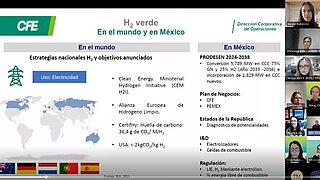Participation in the H2LAC regional webinar on Green Hydrogen in Latin America and the Caribbean
Participation in the H2LAC regional webinar on Green Hydrogen in Latin America and the Caribbean

On July 4th, H2LAC and Women in Green Hydrogen (WiGH) organized a webinar on the Regional Overview of Green Hydrogen in Latin America and the Caribbean, where each participating expert presented the state of the Green Hydrogen (H2V) ecosystem in her country, as well as the progress and challenges in the process of incorporating H2V.
The Latin American and Caribbean region is taking significant steps towards the energy transition, aware of the transformative potential of green hydrogen in reducing dependence on fossil fuels. Countries such as Mexico, Costa Rica, Colombia, Brazil, Peru, Chile, Argentina and Uruguay are leading initiatives from policy formulation to the implementation of innovative technologies, marking a path towards a more sustainable and accessible future for all.
During the event, several emblematic initiatives were highlighted that underline the regional commitment to the development of green hydrogen. Crucial aspects such as regulatory policy, ongoing projects and pending challenges to achieve a wide adoption of this technology were discussed.
Constanza Meneses, coordinator of H2LAC, explained the importance of this collaborative platform, created with the support of the Euroclima Program, GIZ, the World Bank and ECLAC, to promote the development of green hydrogen and its derivatives in the region. According to Meneses, H2LAC facilitates the exchange of information, the articulation of efforts and the strengthening of capacities, fundamental for the joint advance towards a sustainable energy future.
Nicole Gutierrez, WiGH representative, highlighted the inclusion and diversity in the green hydrogen sector, emphasizing the need to promote an active female participation in an industry traditionally dominated by men. This inclusive approach was reflected in the participation of prominent women leaders and experts in the region, who shared perspectives on the current status and future scenarios for green hydrogen in their respective countries.
In the case of Mexico, Iris Cureño, head of CFE's Priority Projects Monitoring and Evaluation Unit, outlined national efforts to integrate green hydrogen into the country's energy matrix. Although Mexico has made progress with projects such as PRODESEN 2024-2038, which plans a significant conversion to the use of green hydrogen in combination with natural gas, it still faces challenges such as the lack of clear regulations and the need for adapted infrastructure.